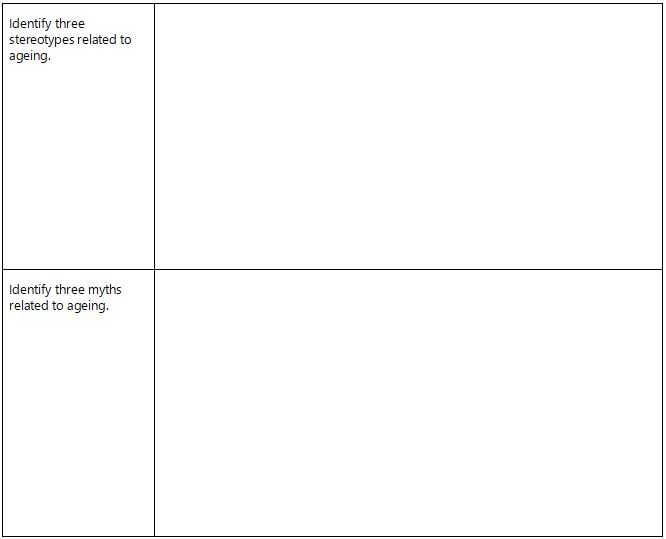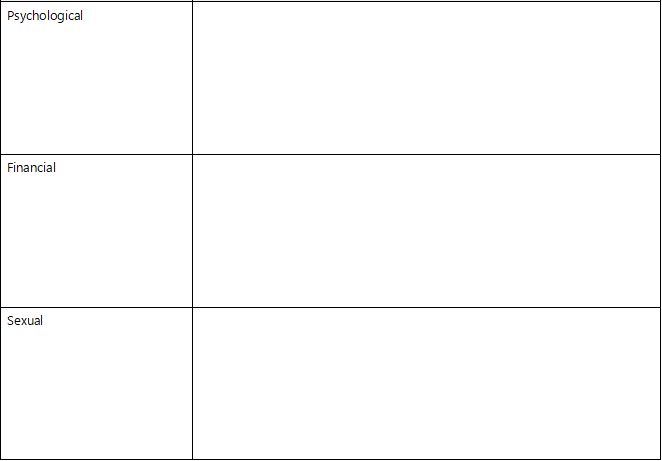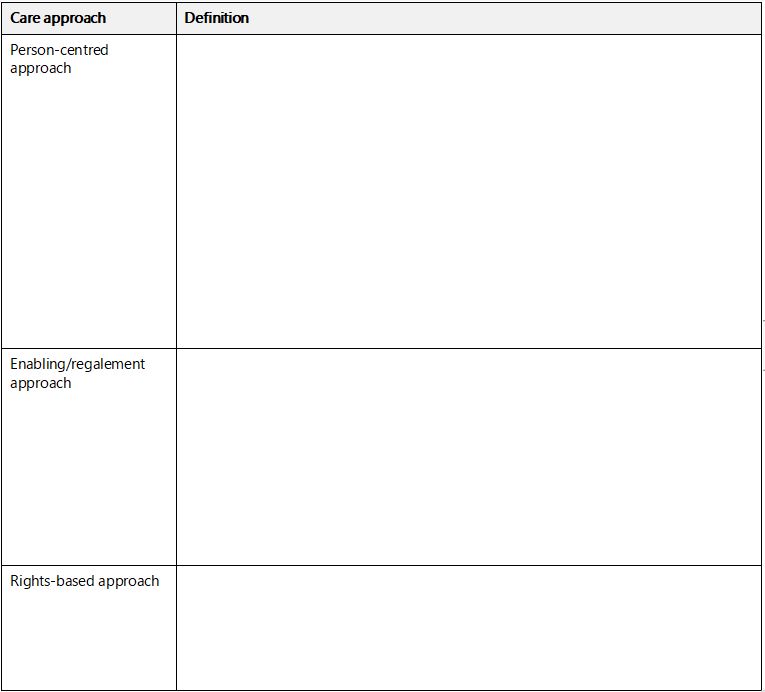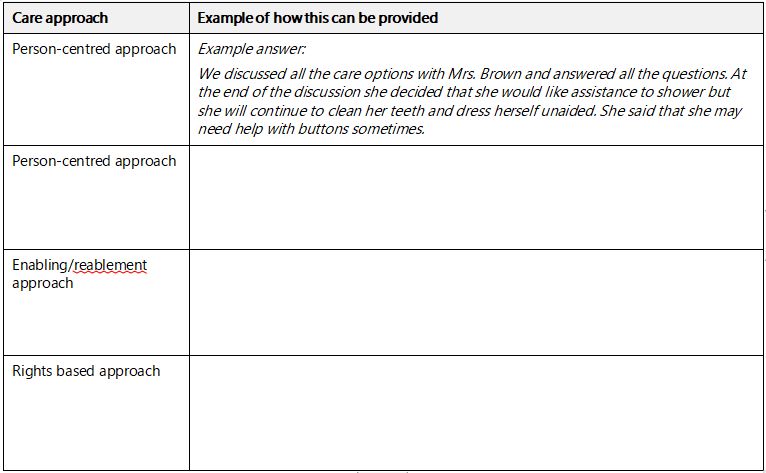CHCAGE001 Facilitate The Empowerment Of Older People Assignment
- Subject Code :
CHCAGE001
- University :
Eduworks Resources Exam Question Bank is not sponsored or endorsed by this college or university.
- Country :
Australia
Question 1
Fill out the table below to show your understanding of the structure and the profile of the aged care sector.
a.Aged care service delivery models
Briefly describe each of the following:
- High-level residential care
- Low-level residential care
- Collocated residential care
- Home and Community Care (HACC)
- Community Aged Care Packages (CACP)
- Extended Aged Care in the Home (EACH)
- Consumer-directed care
- Palliative care
- Respite care
b. Support services
Identify three different types of agencies that can assist with support services for those who are ageing.
Identify three different referral networks that can assist with support services for those who are ageing.
Question 2
- What does normal ageing mean? In your answer, identify three common signs of normal ageing. How can attitude and a healthy lifestyle improve the health and well-being of older people?
- Explain how ageing in place can be a positive approach for older people.
- Provide a definition of active ageing.
- Explain how the palliative care approach helps people to maintain their comfort and quality of life in the final stages of their life.
- Identify two common misconceptions about older people and sexuality.
- Identify one issue that could arise in older age due to a persons gender. Provide an answer for each gender.
- List five changes that occur to the human body as it ages.
- List two psychological changes that can occur due to ageing.
Question 3

- Marginalization is defined as treating a person or group as insignificant or less important than others. Explain how an older persons quality of life can be impacted by marginalization/social devaluation.
Question 4
- Sahra has been diagnosed with Parkinsons disease. She asks her personal care worker, Glynnis, what she can expect in her future. Glynniss father died of Parkinsons so she feels qualified to tell Sahra all about the disease and what she can expect. Glynnis talks about all the things her father experienced. Sahra is overwhelmed but Glynnis is happy to have provided her with the truth. Glynnis does not want to sugar coat it her father never really knew what to expect and he and the family took his illness very hard. Do you believe Glynnis adhered to the role and responsibilities of her job? Explain your answer.
- Imagine a client asked you to get them some over-the-counter medication. You know they are not allowed to take it and refuse. Your client pushes harder and says it will be fine, theyre okay with it and they wont tell on you. What should you do in this situation?
- Give three examples of how a worker could overstep work role boundaries with clients and their families.
- Give three examples of the limitations faced by a worker in their role in the aged care sector.
- Work health and safety is important regardless of the sector in which you work. List three important work health and safety responsibilities of an employee in the aged care sector.
- Explain your duty of care as a personal care worker.
- Explain how a code of ethics guides your work in the aged care sector.
- What is the legislation you must adhere to in your state or territory in regard to anti-discrimination? Include in your response any Commonwealth legislation you must follow.
- Provide three examples of ways in which clients in aged care may experience discrimination.
Question 5
- Assume you are on your work placement and something happens that you really want to tell your friends and family about. Telling your friends and family means that you would need to discuss a clients situation and identifiable information.
Should you share your experiences? Explain your answer. - You are completing your assessments for this course and need to document your experiences with three older people. Two of your clients are more than happy for you to write about them and give consent. The third client refuses to give consent as they do not want people knowing about their life and their health thats personal information!
List five things you could tell your client to reassure them their privacy will be maintained. - Identify the legislation you must adhere to in relation to privacy and confidentiality. Provide a brief description of its requirements.
- Briefly describe the concept of disclosure. In your answer, list two situations where you would need to disclose/report information a client tells you.
Question 6
- Explain how person-centred care assists older people to feel in control of their care.
- Explain how a worker in the aged care sector can empower their clients.
- Explain how dis empowerment can impact an older person and how it can also impact the aged care worker when providing care.
Question 7
Jeremy has dementia. He now ignores his personal hygiene and is incontinent. However, he will follow simple instructions.
- What personal care support does Jeremy need? As Jeremys personal care worker, how would you encourage his participation and independence?
Jaydia is very hard of hearing. He wears hearing aids that assist, but he still has difficulty hearing. He finds his deafness very socially isolating and tends to withdraw. - As a personal care worker, how could you support Jaydia with this problem?
Hamish is dying of cancer. There is a treatment available, but he chooses not to go ahead with it saying that he does not wish to prolong his life. He decides he is going to travel and do some things he has always wanted to do but never has. He has planned a tandem sky dive and white-water rafting. He seems the happiest he has been since his diagnosis. - How will Hamishs dignity of risk influence the life he has left to him?
Question 8
Participating in the community is important for many people. As people age, community engagement can often become more difficult.
Think of a person you know who is elderly or imagine yourself as elderly and frail.
- Identify three types of community/social participation that can encourage older people to engage socially and undertake their tasks of daily living. List three challenges that could be faced.
- Choose one of the challenges that you identified above. What support could be given to someone so they can continue their community participation?
Question 9


- If you suspected that a client was being abused, what must you do?
Question 10
Harry has a fall during one of his walks. You help him up and assist him back to his room. He appears to be okay, but is shaken.
- What should you do to report the incident (both verbally and in writing)?
- Why is it important to report this incident given that Harry does not appear to be injured?
- How would you respond to Elsie? Why would you respond in this way?
Question 11

- Explain how each of the care approaches below could be provided by a carer. An example has been done for you.

Question 12
Research a best-practice aged care program (for example, you might choose the Eden Alternative or Active Service Model).
In one to two paragraphs describe the program and why it is best practice.
Question 13
Mabel lives at home alone. She is a very independent woman and enjoys working as a volunteer in the community and also runs an art class. Mabel fell and broke her shoulder. She needed surgery and spent ten days in hospital. Once she was clinically stable, she was worried about how she would manage at home as she had no family close by. She was told that she would be dependent on support for activities of daily living for up to two months while her shoulder repaired itself.
Mabel was very worried that she would have to remain in hospital for that time, however arrangements were made for her to be discharged from hospital and receive assistance at home until she was able to be independent once more.
A care plan was set up and was planned to go for six weeks at which time it would be re-evaluated. Care included showering, dressing, cleaning, transport to physiotherapy, occupational therapy, and meals on wheels.
At her review after six weeks Mabel has very happy with her progress. She was going back to volunteer work one day a week and planning to restart her art classes next week. She had cancelled the meals on wheels the previous week as she found she was able to cook for herself now. It was agreed that she no longer needed home support.
Discuss the advantages that a reablement approach had for Mabel compared with more traditional models of care.
Question 14
- Describe the concept of human rights. In your answer, refer to the foundation document developed by the United Nations that outlines our basic rights and freedoms.
- Identify three ways in which a client in aged care could have their human rights ignored.
Are you struggling to keep up with the demands of your academic journey? Don't worry, we've got your back! Exam Question Bank is your trusted partner in achieving academic excellence for all kind of technical and non-technical subjects.
Our comprehensive range of academic services is designed to cater to students at every level. Whether you're a high school student, a college undergraduate, or pursuing advanced studies, we have the expertise and resources to support you.
To connect with expert and ask your query click here Exam Question Bank

